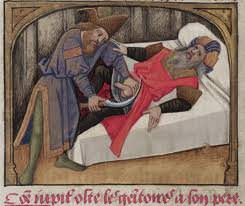Eunuchs in the Byzantine Empire: A Study in Byzantine Titulature and Prosopography
Guilland, Rodolphe
English translation of a French article from: Études Byzantines
Abstract
The present study cannot be exhaustive, for a number of reasons. It is part of a series of studies intended to contribute to the history of administration of the Byzantine Empire, which is still so poorly understood. It is conceived as an introduction to the study of the titles and dignities enjoyed by eunuchs in Byzantium. The information given about the persons is summary, because the complete notes will appear in the Byzantine Prosopography that is being prepared by my dear friend and knowledgeable colleague R.P.V. Laurent. The citations of Byzantine authors are made according to the Bonn Byzantine collection unless otherwise indicated.
Eunuchs (hoi eunouchoi) were very numerous in Byzantium. According to the very strong statement of Constantine VII, they swarmed around the Grand Palace like flies around a cow-shed in the summer (Theoph. Cont. 318). Eunuchs were always very sought after by the Byzantine emperors. Zonaras writes (III 250), “Romaioi peri tous ektomias eptoeemenoi aei [the Byzantines were always passionately excited for castrati]”. In the era of Irene (797-802) eunuchs formed a veritable swarm in the Grand Palace: ho polus toon eunouchoon esmos [the number of the eunuchs was as a swarm of bees] (Cedr. II 29). One could not give the emperor any more valuable gift than eunuchs. Among the rich presents given by Danielis to Basil I (867-886) were 300 young slaves, including one hundred eunuchs, because “he knew that there was always room for eunuchs in the imperial palace” (Theoph. Cont. 318). Liutprand relates that Theobald I, marquis of Spoleto (929-936), after having made prisoners of Greek soldiers, turned them into eunuchs and wrote to the general: “Quoniam vestro sancto imperatori spadonibus nil pretiosius esse cognovi, hos studui pauculos sibi verecunde transmittere, plures, Deo propitio, transmissurus.” [Since I know of nothing more valued by your holy emperor than eunuchs, I have taken pains humbly to send these few to him, and, God willing, I will send more].
Guilland, Rodolphe
English translation of a French article from: Études Byzantines
Abstract
The present study cannot be exhaustive, for a number of reasons. It is part of a series of studies intended to contribute to the history of administration of the Byzantine Empire, which is still so poorly understood. It is conceived as an introduction to the study of the titles and dignities enjoyed by eunuchs in Byzantium. The information given about the persons is summary, because the complete notes will appear in the Byzantine Prosopography that is being prepared by my dear friend and knowledgeable colleague R.P.V. Laurent. The citations of Byzantine authors are made according to the Bonn Byzantine collection unless otherwise indicated.
Eunuchs (hoi eunouchoi) were very numerous in Byzantium. According to the very strong statement of Constantine VII, they swarmed around the Grand Palace like flies around a cow-shed in the summer (Theoph. Cont. 318). Eunuchs were always very sought after by the Byzantine emperors. Zonaras writes (III 250), “Romaioi peri tous ektomias eptoeemenoi aei [the Byzantines were always passionately excited for castrati]”. In the era of Irene (797-802) eunuchs formed a veritable swarm in the Grand Palace: ho polus toon eunouchoon esmos [the number of the eunuchs was as a swarm of bees] (Cedr. II 29). One could not give the emperor any more valuable gift than eunuchs. Among the rich presents given by Danielis to Basil I (867-886) were 300 young slaves, including one hundred eunuchs, because “he knew that there was always room for eunuchs in the imperial palace” (Theoph. Cont. 318). Liutprand relates that Theobald I, marquis of Spoleto (929-936), after having made prisoners of Greek soldiers, turned them into eunuchs and wrote to the general: “Quoniam vestro sancto imperatori spadonibus nil pretiosius esse cognovi, hos studui pauculos sibi verecunde transmittere, plures, Deo propitio, transmissurus.” [Since I know of nothing more valued by your holy emperor than eunuchs, I have taken pains humbly to send these few to him, and, God willing, I will send more].
eunuchs formed a veritable swarm in the Grand Palace: ho polus toon eunouchoon esmos [the number of the eunuchs was as a swarm of bees] (Cedr. II 29). One could not give the emperor any more valuable gift than eunuchs. Among the rich presents given by Danielis to Basil I (867-886) were 300 young slaves, including one hundred eunuchs, because “he knew that there was always room for eunuchs in the imperial palace” (Theoph. Cont. 318). Liutprand relates that Theobald I, marquis of Spoleto (929-936), after having made prisoners of Greek soldiers, turned them into eunuchs and wrote to the general: “Quoniam vestro sancto imperatori spadonibus nil pretiosius esse cognovi, hos studui pauculos sibi verecunde transmittere, plures, Deo propitio, transmissurus.” [Since I know of nothing more valued by your holy emperor than eunuchs, I have taken pains humbly to send these few to him, and, God willing, I will send more].
Click here to read this article from Études Byzantines
Subscribe to Medievalverse
Related Posts